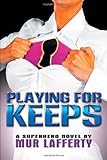Text MUDs really didn’t have much of a perspective because they didn’t have a camera. You entered a room and were given a description of the room. Anyone in the same room was “within reach” and to get out of reach you left the room. Once games went graphical, the camera became a part of the game. On one side you have Ultima Online which followed the Ultima top-down isometric, decidedly 3rd person. On the other side you had EverQuest which owed its perspective to Doom and Quake and other 1st person shooters. Later on, EQ would free up the camera so that people could play in 3rd person, but the game was designed such that you didn’t really gain much from it (unless you were pulling, in which case you could use the 3rd person camera to look around corners and behind other obstacles).  As MMOs have moved on, pretty much all of them have opted for the more tactical 3rd person view. Pulled back, staring at the back of your character, giving you an almost omniscient view of the world. It is very popular, in large part I suspect because it makes the game easier. When you can see around yourself in 360 degrees so that nothing can surprise you, life is more… predictable.
While playing the Star Trek Online open beta, I found myself really enjoying the space combat. The ground game was pretty much your typical bland MMO, like WoW or City of Heroes. In fact, it is almost identical to Pirates of the Burning Sea. But the space combat (much like the sea combat of PotBS) felt more much… alive. Even though it was pretty awesome, it still felt like something was missing, and it wasn’t until a friendly discussion and an offhand comment that I put my finger on it. A friend said, “I wish you could fight from the bridge.” And I light went on in my brain.
What is missing from Star Trek Online, and was missing from PotBS, was a more 1st person view of the game. STO’s space combat would be incredible if you played from the bridge, had to set the view screen, keep an eye on tactical items like scanners.
In my discussions with other folks about 1st vs 3rd person view, many of them cited PvP as being a reason for 3rd person. Â You need to be able to see if someone is stalking up behind your guy. Â And that discussion caused another light to go on. Â In EQ, when I played primarily in 1st person, I was my character. Â I was Ishiro Takagi, monk of Qeynos. Â When I played WoW, where 3rd person is the default, I was controlling my character. Â I was Jason, sitting at a computer controlling the actions of Ishiro, Alliance priest. Â Possibly owing to its roots in RTS games, WoW plays like a giant RTS where you only get one unit. Â The immersion is gone.
Stepping outside MMOs, in recent years I’ve been playing more console games. Â Back in the day, before I discovered MMOs, I played a ton of 1st person shooters. Â Before I started spending hours camping spawns in EverQuest, I was spending hours racing for flags and battling for control points in Team Fortress for Quake. Â In the last couple of years, games like Gears of War, which everyone else seems to go nuts for, just leave me feeling empty, largely because the viewpoint of the game is watching over the shoulder of a guy, not being the guy. Â I loved Dead Space, but there was a distance from the character, even though the integration of the UI into the game helped I still wasn’t in the head of the hero. Â On the other hand, Left 4 Dead and Left 4 Dead 2 are just so awesome. Â No longer am I looking at the back of the hero, controlling him, I am the hero fighting my way through the hordes of the dead.
This is what is missing. Â This is what makes it so easy to casually cancel my MMO subscriptions and never come back. Â I never feel like I am in the game, just that I’m playing it. Â Sure, I could play many of the games out there in 1st person, but they aren’t designed for 1st person, they are designed for 3rd and playing in 1st puts me at a disadvantage to every other player. Â I hope more games consider locking in and designing for 1st person in the future.
What do you think?
 Mur Lafferty crafts a world where superheroes must be licensed to practice, and are paid by the city through tax revenue. Â A world where those with powers apply to the Academy and have their powers tested. Â If you are deemed worthy, you get a name and a suit and get to fight crime. Â If you are deemed weak, you get to try and live like a normal person and try to forget your aspirations of heroism. Â This is the world of
Mur Lafferty crafts a world where superheroes must be licensed to practice, and are paid by the city through tax revenue. Â A world where those with powers apply to the Academy and have their powers tested. Â If you are deemed worthy, you get a name and a suit and get to fight crime. Â If you are deemed weak, you get to try and live like a normal person and try to forget your aspirations of heroism. Â This is the world of